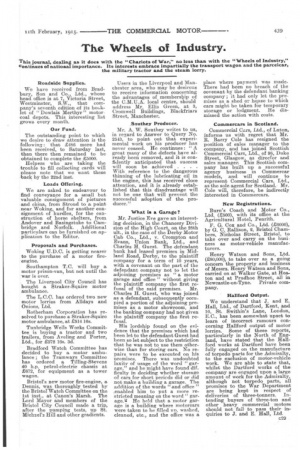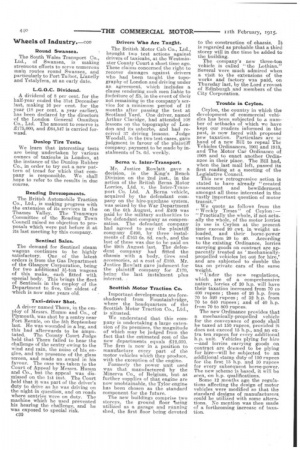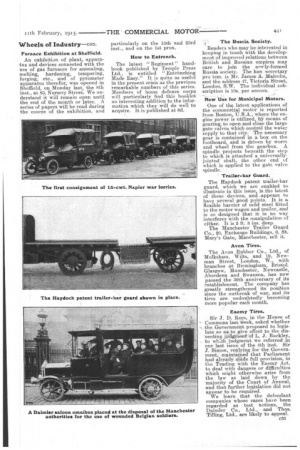The Wheels of Industry.
Page 13

Page 14

Page 15

If you've noticed an error in this article please click here to report it so we can fix it.
This journal, dealing as it does with the "Chariots of War," no less than with the "Wheels of Industry," continues of national importance. Its interests embrace impartially the transport wagon and the parcelcar, the military tractor and the steam lorry.
Roadside Supplies.
We have received from Bradbury, Son and Co., Ltd., whose head office is at 7, Victoria Street, Westminster, S.W., that company's seventh edition of its boalet of " Dowlais Merthyr" motor• coal depots. This interesting list grows every month.
Our Fund.
The outstanding point to which we desire to draw attention is the following: that 2486 more had been received, to Saturday last, than there then remained to be obtained to complete the 25000.
Helpers who are taking the trouble to fill collecting cards will alease note that we want these hack by the 22nd inst.
Loads Offering.
We are asked to endeavour to find conveyance for a small but valuable consignment of pictures and china, from Stroud to a point • near Woking, and for another consignment of hurdles, for the construction of horse shelters, from • Andover and Basingstoke to Cambridge and Norfolk. Additional particulars can be furnished on application to the Editor.
Proposals and Purchases.
Woking U.D.C. is getting nearer to the purchase of a motor fireengine.
Southampton T.C. will buy a motor prison-van, but not until the war is over.
The Liverpool City Council has bought a Straker-Squire motor ambulance.
The L.C.C. has ordered two new motor lorries from Alldays and Onions, Ltd.
Rotherham Corporation has resolved to purchase a Straker-Squire motor ambulance, at 2514 16s.
Tunbridge Wells Works Committee is buying a tractor and two trailers, from Aveling and Porter, DA., for 2572 16s. 3d.
Bradford Watch Committee has decided to buy a motor ambulance; the Tramways Committee has ordered a Tilling-Stevens 40 h.p. petrol-electric chassis at 2672, for equipment as a tower wagon.
Bristol's new motor fire-engine, a Dennis, was thoroughly tested by the BristorWatch Committee on the 1st inst., at Canon's Marsh. The Lord Mayor and members of the Bristol City Council made a trip, after the pumping tests, up St. Michael's Hill and other gradients.
Users in the Liverpool and Manchester area, who may be desirous to receive information concerning the advantages of membership of the C.M.U.A. local centre, should address Mr. Ellis Green, at 3, Cromwell Buildings, Blackfriars Street, Manchester.
.Southey Producer.
Mr. A. W. Southey writes to us, in regard to Answer to Query No. 2543, to point out that experimental work on his producer has never ceased. He continues : "A great many of the defects have already been removed, and it is confidently anticipated that success will soon be achieved . . . . With reference to the dangerous thinning of the lubricating oil in the engine, this has received close attention, and it is already established that this disadvantage will not be one that will prevent the suceeseful adoption of the producer."
What is a Garage?
Mr. Justice Eve gave an interesting decision, in the Chancery Division of the High Court, on the 28th ult., in the case of the Derby Motor
Cab td., v. Crompton and Evans, Co.,ilnion Bank, Ltd., and Charles H. Guest. The defendant bank had leased premises in Midland Road, Derby, to the plaintiff company for a term of 10 years, with a covenant on the part of the defendant company not to let the adjoining premises as "a motor garage and office" without giving the plaintiff company the first re fusal of the said premises. Mr. Charles H. Guest, who was joined as a defendant, subsequently occupied a portion of the adjoining premises as a motor showroom, and the banking company had not given the plaintiff company the first refusal.
His lordship found on the evidence that the premises which had been let to the defendant Guest had been so let subject to the restriction that he was not to use them otherwise than for storing cars. No repairs were to be executed on his premises. There was undoubted laxity of usage of the word "garage." and he might have found difficulty in deciding whether storage Of ears for short perieds did or did not make a building a garage. The addition of the words and office" ,enabled him to put a more restricted meaning on the word " garage.' He He held that a motor garage is a building where motorcars were taken to be filled un, washed, cleaned, etc., and the office was a place where payment was made. There had been no breach of the covenant by the defendant banking company ; it had only let the premises as a shed or house to which cars might be taken for temporary storage or lodgment. He dismissed the action with costs.
Commerears in Scotland.
Commercial Cars, Ltd., of Luton, informs us with regret that Mr. R. Barry Cole has resigned the position of sales manager to the company, and has joined Scottish Commercial Cars, Ltd., of 98, Duke Street, Glasgow, as director and sales manager. This Scottish company has built up a successful agency business in Commercar models, and will continue to represent Commercial Cars, Ltd., as the sole agent for Scotland. Mr. Cole will, therefore, be indirectly interested in Comm ercars.
New Registrations.
Burn's Coach and Motor Co., Ltd. (2500), with its office at the Agricultural Hotel, Penrith.
F. G. Cox and Co., Ltd. (26000), by G. C. Ranson, 2, Bristol Chambers, Nicholas Street, Bristol, to take over and carry on the business as motor-vehicle ixianufaeturers.
Henry Watson and Sons, Ltd. (280,000), to take over as a going concern the property and business of Messrs. Henry Watson and Sons, carried on at Walker Gate, at Heaton and at Prudhoe Street, all in Newcastle-on-Tyne. Private company.
Hallford Output.
We understand that J. and E. Hall, Ltd., of Dartford, Kent, and 10, St. Swithin's Lane, London, E.C., has been somewhat upset to learn of incorrect rumours concerning Hallford output of motor lorries. Some of these reports, particularly in the North of England, have stated that the Hanford works at Dartford have been fully engaged on the manufacture of torpedo parts for the Admiralty, to the exclusion of motor-vehicle work. We are able to state that, whilst the Dartford works of the company are engaged upon a large amount of work for the Admiralty, although not torpedo parts, all promises to the War Department are being kept in respect of deliveries of three-tonners. Intending buyers of three-ton and other heavy commercial motors should not fail to pa-se their inquiries to J. and E. Hall, Ltd. Round Swansea.
The South Wales Transport Co., Ltd., of Swansea, is making strenuous efforts to serve numerous main routes round Swansea, and particularly to Port Talbot, 11anelly and Ystalyfera, at an early date.
L.G.O.C. Dividend.
A dividend of 8 per cent. for the half-year ended the 31st December last, making 16 per cent, for the year (18 per cent, a year earlier), has been declared by the directors of the London General Omnibus Co., Ltd. The amount to reserve is 2175,000, and 264,547 is carried forwad.
Dunlop Tire Tests.
We learn that interesting tests are being undertaken by various owners of taxicabs in London, at the instance of the Dunlop Rubber Co., in order to try out a new pattern of tread for which that company is responsible. We shall hope to refer to the results in due course.
Reading Developments.
The British Automobile Traction Co., Ltd., is making progress with the extension of its services in the Thames Valley. The Tramways Committee of the Reading Town Council raised no objection to proposals which were put before it at its last meeting by this company.
Sentinel Sales.
The demand for Sentinel steam wagons continues to be highly satisfactory. One of the latest orders is from the Gas Department of the Glasgow Corporation, being for two additional 3-ton wagons of this make, each fitted with special body. This brings the fleet of Sentinels in the employ of the Department to five, the oldest of which is now nine years old.
Taxi-driver Shot.
A driver named Thorn, in the employ of Messrs. Humm and Co., of Plymouth, was shot by a sentry near Fort Rennie, on the 5th September last. He was wounded in a leg, and this had afterwards to be amputated. The County Court Judge held that Thorn failed to hear the challenge of the sentry owing to the wind and rain, the noise of his engine, and the presence of the glass 'screen, and made an award in his favour. The case was taken to the Court of Appeal by Messrs. Humni and Co., but the appeal was dismissed on the 1st inst. The Court held that it was part of the driver's duty to drive as he was driving on the night in question, and on roads where sentries were on duty. The machine which he used prevented his hearing the challenge, and he was exposed to special risk.
c30
Drivers Who Are Taught.
The British Motor Cab Co., Ltd., brought two test actions against drivers of taxicabs, at the Westminster County Court a short time ago. These claims concerned the right to recover damages against drivers who had been taught the topography of London and driving under an agreement, which includes a clause rendering such men liable to forfeiture of £5, in the event of their not remaining in the company's service for a minimum period of 12 months after passing the test at Scotland Yard. One driver, named Arthur Claridge, had attended. 108 lessons on the topography of London and its suburbs, and had received 37 driving lessons. Judge Woodall, in the two test cases, gave judgment in favour of the plaintiff company, payment to he made by instalments of 7s. 6d. weekly.
Berne, v. Inter-Transport.
Mr. Justice Rowlatt gave a decision, in the King's Bench Division on the and inst., in the action of the British Berna Motor Lorries, Ltd. v. the Inter-Transport Co. Ltd. A Berne vehicle, acquired by the defendant company on the hire-purchase system, was seized by the War Department on the 6th August, and 2409 was paid by the military authorities to the defendant company as compensation. The defendant company had agreed to pay the plaintiff company .2490, by three instalments of 2163 Os. 8d. each, and the last of these was due to he paid on the 29th August last. The defendant company had fitted the chassis with a body, tires and accessories, at a cost of 2160. Mr. Justice Rowlatt gave judgment for the plaintiff company for 2170, being the last instalment plus interest.
Scottish Motor Traction Co.
Important developments are foreshadowed from Fountainbridge, where the headquarters of the Scottish Motor Traction Co., Ltd., is situated.
We understand that this company is undertaking a large extension of its premises, the magnitude of which may be judged from the fact that the estimated cost of the new departments equals 212,000. The firm is now in a position to manufacture every part of the motor vehicles which they produce, with the exception of the engine.
Formerly the power unit used was that manufactured by the Minerva Co., of Belgium, hut as further supplies of that engine are now unobtainable, the Tylor engine has been chosen as the standard component for the future.
The new buildings comprise two storeys, the ground floor 'being utilized as a garage and running shed, the first floor being devoted
to the construction of chassis. It is regarded as probable that a third storey will in due time be added to the building.
The company's new three-ton vehicle is called "the Lothian." Several were much admired when a visit to the extensions of the works and factory was paid, on Thursday last, by the Lord rrovost of Edinburgh and members of the City Corporation.
Trouble in Ceylon.
Ceylon, the country in which the development of commercial vehi oles has been subjected to a number of setbacks of which we have kept our readers informed in the past, is now faced with proposed new taxation. Particulars are Le hand of a new Bill to repeal The Vehicles Ordinances, 1901 and 1913, and The Motor Car Ordinance of 1908 and to enact another Ordinaeace in their place. The Bill had, when the last mail left, passed its first reading at a meeting of the Legislative Council.
This new retrogressive action is stated to have already "created
amazement and bewilderment amongst all those interested in the vastly important question of motor transit."
We quote as follows from the "Weekly Times" of Ceylon :— " Practically the whole, if not actu ally the whole, of the motor lorries in use in Ceylon at the present time exceed 20 cwt. in weight un loaded, and their horse-power varies from 20 to 40. According to the existing Ordinance, lorries carrying goods on contract are apparently treated as 'mechanically propelled vehicles let out for hire,' and are subjected to double the tax on private cars of the same weight.
"Under the new regulations, which are of a. comprehensive
nature, lorries of 20 h.p. will have their taxation increased from 70 to 400 rupees ; thase of 26 h.p. from 10 to 520 rupees ; of 32 h.p. from 70 to 640 rupees ; and of 40 h.p. from 70 to 800 rupees.
The new Ordinance provides that a mechanically-propelled vehicle for the conveyance of goods shall
be taxed at 150 rupees, provided it does not exceed 15 h.p., and an ex
tra ten rupees for every additional h.p. unit. Vehicles plying for hire —and lorries carrying goods on contract are deemed to be plying for hire—will be subjected to an additional stamp duty of 150 rupees
for the first 15 lap. and 10 rupees for every subsequent horse-power. The new scheme is based, it will be seen, on h.p. qualifications_
Some 12 months ago the regulations affecting the design of motor vehicles were modified so that the standard designs of manufacturers& could be utilized with some altera tions. No mention was then made of a forthcoming increase of taxation. An exhibition of plant, apparatus and devices connected with the use of gas furnaces for annealing, melting, hardening, tempering, forging, etc., and of pyrometer apparatus therefor, was opened in Sheffield, on Monday last, the 8th inst. at 83, Nursery Street. We understand it will remain open until the end of the month or later. A series of papers will be read during the course of the exhibition, and particularly on the 15th and inst., and on the 1st prox.
How to Entrench.
The latest " Regiment" handbook published by Temple Press Ltd,, is entitled " Entinehing Made Easy." It is quite as useful in the present crisis as the previous remarkable numbers of this series. Members of home defence corps will particularly find this booklet an interesting addition to the information which they.will do well to acquire. It is published at 6d.
• Readers who may be interested in keeping in touch with the development of improved relations between British and Russian empires may care to join the ne•viy-formed Russia society. The hon %eeretary pro tern. is Mr. James A. Malcolm, and the address 47, Victoria Street, London, S.W. The individual subscription is 10s. per annum.
New 'Use for Municipal Motors.
One of the latest applications of the commerbial motor is reported from Boston, U.S.A., where the engine power is utilized, by means of gearing, to open and close the large gate valves which control the water supply to that city: The necessary gear is contained in a box on the footboard, and is driven by worm and wheel from the gearbox. A spindle .projects beneath the step to which is attached a universallyjointed shaft, the other end of which is applied to the gate valve spindle.
Trailer-bar Guard.'
The Haydock patent trailer-bar guard, which we are enabled to illustrate in this issue, is the latest of these devices, and _appears to have several good points. It is a flexible barrier of mild steel fitted to the motor wagon and trailer, and is so designed that it in no way interferes with the manipulation of either. It is 2 ft. 3 ins. deep.
The Manchester Trailer Guard Co., 20, Exchange Buildings, 6, St. Mary's Gate, Manchester, sell it.
Avon Tires.
The Avon Rubber td. of
Melksham. Wilts, and Co.,1 ' 9, New
man Street, London, W., with branches at Birmingham, Bristol. Glasgow, Manchester, Newcastle, Aberdeen and Swansea, has now passed the 30th anniversary of its establishment. The company has greatly strengthened its position since the outbreak of war, and its tires are undoubtedly becoming more popular each month.
Enemy Tires.
Sir J. D. Rees, in the House of Commons last week, asked whether the Government proposed to legislate so as, to give effect to the dissenting Mg-Meat "Of L. J. Buckley, to wh:ch.judgment we referred in our last issue of the 4th inst. Sir j. Simon, replying for the Government, maintained that Parliament had already Made full provision, in the Trading With the Enemy Act, to deal with dangers or difficulties which might otherwise arise from the law as laid down by the majority of the Court of Appeal, and that further legislation did not appear to be required.
We learn that the defendant companies whose cases have been regarded as test netions, the Daimler Co., Ltd., and Thos. Tilling, Ltd., are likely to appeal.






















